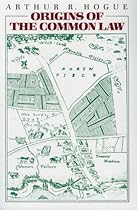Read Origins of the Common Law by Arthur R. Hogue Online
[Arthur R. Hogue] ↠ Origins of the Common Law ½ Download Online eBook or Kindle ePUB. Origins of the Common Law Written for the beginning student as well as the experienced scholar, this introductory analysis of the origin and early development or the English common law provides and excellent grounding for the early study of legal history. The author begins with a discussion of the relationship between the early rules of common law and the social order they serve during this period and concludes with an extended commentary on the durability and continued growth of the common law in modern times.Arthur

| Title | : | Origins of the Common Law |
| Author | : | |
| Rating | : | 4.38 (698 Votes) |
| Asin | : | 086597053X |
| Format Type | : | paperback |
| Number of Pages | : | 287 Pages |
| Publish Date | : | 2013-06-06 |
| Language | : | English |
It deals with the development of the English Common Law on a level which is accessible. "The book has an important function for which it does not have any real competition. It is well written and reliable."
Three Stars Good read. C R said A Rewarding History. This is wonderful book about the origins of the Common Law in England between the years 115A Rewarding History C R This is wonderful book about the origins of the Common Law in England between the years 1154, when Henry II became king, and 1307, when Edward I died. It is a history that does not require the reader to be a lawyer to have legal training. The author claims the book provides an excellent grounding for the study of later legal developments.I was surprised to see that there was a constant tension between the kings and the the barons who wanted to limit the kings power. I w. , when Henry II became king, and 1A Rewarding History This is wonderful book about the origins of the Common Law in England between the years 115A Rewarding History C R This is wonderful book about the origins of the Common Law in England between the years 1154, when Henry II became king, and 1307, when Edward I died. It is a history that does not require the reader to be a lawyer to have legal training. The author claims the book provides an excellent grounding for the study of later legal developments.I was surprised to see that there was a constant tension between the kings and the the barons who wanted to limit the kings power. I w. , when Henry II became king, and 1307, when Edward I died. It is a history that does not require the reader to be a lawyer to have legal training. The author claims the book provides an excellent grounding for the study of later legal developments.I was surprised to see that there was a constant tension between the kings and the the barons who wanted to limit the kings power. I w. 07, when Edward I died. It is a history that does not require the reader to be a lawyer to have legal training. The author claims the book provides an excellent grounding for the study of later legal developments.I was surprised to see that there was a constant tension between the kings and the the barons who wanted to limit the kings power. I w. "A Guide to Legal Thought" according to James E. Egolf. Arthur R. Hogue (1906-1986) wrote a succinct readable account of Medieval English Common Law. Hogue also provided a link between Medieval English Law and modern juris prudence. Readers are introduced to what the Common Law is and what it is not. Hogue's book surveyed English Common Law between 115A Guide to Legal Thought James E. Egolf Arthur R. Hogue (1906-1986) wrote a succinct readable account of Medieval English Common Law. Hogue also provided a link between Medieval English Law and modern juris prudence. Readers are introduced to what the Common Law is and what it is not. Hogue's book surveyed English Common Law between 1154 to 1307, and, contrary to popular opinion, the Common Law constrained English monarchs and other executive authority.Hogue was clear that English Common Law was based accepte. to 1A Guide to Legal Thought Arthur R. Hogue (1906-1986) wrote a succinct readable account of Medieval English Common Law. Hogue also provided a link between Medieval English Law and modern juris prudence. Readers are introduced to what the Common Law is and what it is not. Hogue's book surveyed English Common Law between 115A Guide to Legal Thought James E. Egolf Arthur R. Hogue (1906-1986) wrote a succinct readable account of Medieval English Common Law. Hogue also provided a link between Medieval English Law and modern juris prudence. Readers are introduced to what the Common Law is and what it is not. Hogue's book surveyed English Common Law between 1154 to 1307, and, contrary to popular opinion, the Common Law constrained English monarchs and other executive authority.Hogue was clear that English Common Law was based accepte. to 1307, and, contrary to popular opinion, the Common Law constrained English monarchs and other executive authority.Hogue was clear that English Common Law was based accepte. 07, and, contrary to popular opinion, the Common Law constrained English monarchs and other executive authority.Hogue was clear that English Common Law was based accepte
Written for the beginning student as well as the experienced scholar, this introductory analysis of the origin and early development or the English common law provides and excellent grounding for the early study of legal history. The author begins with a discussion of the relationship between the early rules of common law and the social order they serve during this period and concludes with an extended commentary on the durability and continued growth of the common law in modern times.Arthur Reed Hogue (1906–1986) was Professor of History at Indiana University.. Between 1154, when Henry II became king, and 1307, when Edward I died, the common law underwent spectacular growth
Download Origins of the Common Law
Download as PDF : Click Here
Download as DOC : Click Here
Download as RTF : Click Here
